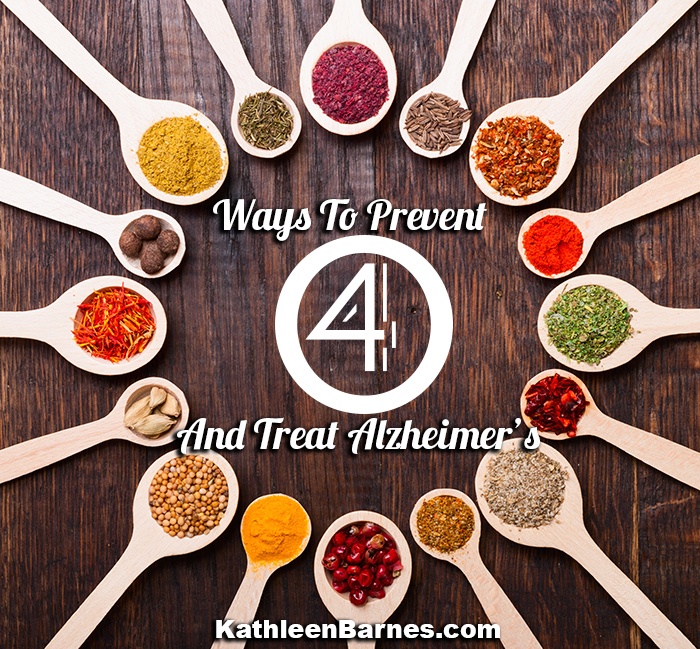My regular readers know that I have particular concerns about Alzheimer’s disease and dementia since they run in my family.
All of us are concerned about retaining memory and cognitive function as we age and most of us know that dementia is not a normal part of the aging process.
Here are some excellent natural ways to prevent and treat Alzheimer’s, with strong scientific evidence to back them up:
Curcumin: The Golden Knight or the Golden Goddess
I’ve written a great deal about curcumin and its impressive health benefits, including some recent powerful proof that curcumin not only protects and heals brain cells from the characteristic plaques and tangles of dementia, it can also prompt the body to grow new brain cells.
I love curcumin so much that I published a book about it last year: Curcumin the 21st Century Cure.
Our curcumin book calls this wonder substance “The Golden Knight” and was interested to learn from Sayer Ji of GreenMedInfo.com that turmeric, the mother substance of curcumin, is regarded as “The Golden Goddess” in India.
Until just a few years ago, science insisted that humans could not increase the number of brain cells we had a birth. Now, with the birth of a new science called neurogenesis, we know that we can grow new brain cells throughout our lives.
That prompts many questions about so-called medical and scientific “truths” later discovered to be untruths. But I digress.
Curcumin is a potent anti-inflammatory, proven to relieve chronic pain and arthritis, prevent heart disease, diabetes and cancer and ease depression and other brain disorders.
As I mentioned earlier, curcumin is extracted from turmeric, a golden tuber used in Indian curries that gives it the characteristic flavor and color. But unless you are Indian or prepared to eat turmeric three times a day for life, it’s unlikely that the turmeric spice will give you enough active ingredients to be effective. In fact, even the curcumin, if not extracted properly, is of little therapeutic value.
The most interesting research on curcumin has been performed on a specialized extract called BCM-95. Look for it in your supplements and you’ll be assured you have the best quality.
Coconut oil
Coconut oil is in itself a healthy fat and a unique medium-chain triglycerides (MCTs), so there is no harm in trying this method of treatment that has little scientific support so far.
The MCTs are directly converted by the liver into ketones, which work as brain food. Those ketones may actually restore and renew neurons and nerve function, improving brain function.
The theory comes from Dr. Mary Newport, an M.D. in Florida whose remarkable story of treating her husband, who was diagnosed with Alzheimer’s at the age of 51, with coconut oil. Her treatment gave him at least two years of dramatically improved mental function. Take a look at this short video: https://www.youtube.com/watch?v=ZZOR-Qd3QSg
Don’t let the lack of scientific backing dissuade you. Since no one can patent coconut oil (a natural substance) and market it as a drug for which they’d charge $50 a dose, no one wants to spend the money to research it. In fact, a 16-ounce jar of high quality organic coconut oil, enough to last two months, sells for $9 or less.
Black sativa or black seed
This seed, nigella sativa, has been shown to prevent Alzheimer’s and slow the progression of the disease in elderly people without side effects.
A study published in the Journal of Ethnopharmacology showed ignificant improvements in memory, attention and cognition without any negative changes in any biochemical markers of cardiac, liver or kidney function during the nine-week study period.
Like curcumin and cinnamon mentioned below, black sativa is commonly used as a food in India, where Alzheimer’s and dementia are rare.
The powerful seed has a host of other health benefits that suggest it could be a wise addition to a supplement or dietary program.
Cinnamon
Cinnamaldehyde and epicatechin, the compounds that give cinnamon its pungent sweet taste have been shown to help stop “tangles” of tau protein — notorious in the memory-robbing neurodegenerative disease — from forming in the brain.
In an animal study published early this year in the Journal of Alzheimer’s Disease, researchers found that the antioxidants in cinnamon helped prevent the clumping that is characteristic of Alzheimer’s disease.
Other studies has shown the value of cinnamon in lowering blood sugar.
The bottom line
If you love Indian food, go for it!
If you’re not up to eating it every day, consider high quality supplements that can protect your brain as well as improve many aspects of your health.







